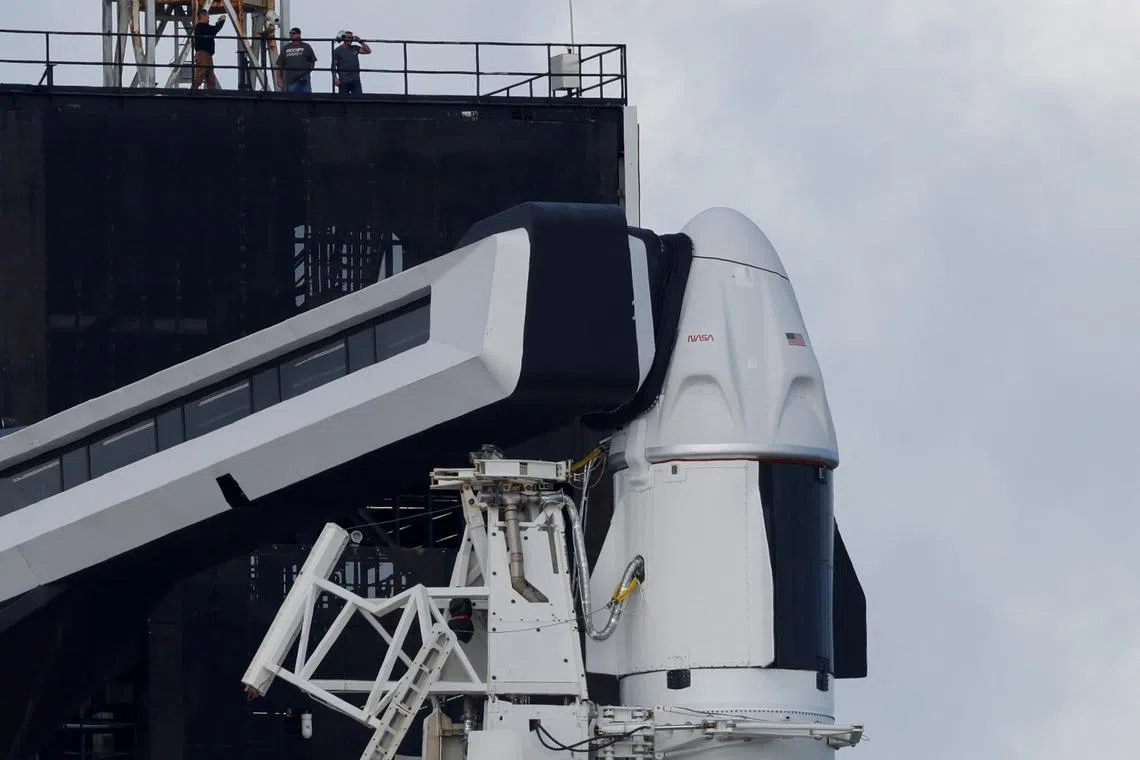Musk-Trump breakup puts billions in SpaceX contracts at risk, jolting US space programme
Sign up now: Get ST's newsletters delivered to your inbox

SpaceX's Dragon spacecraft are vital for ferrying Nasa astronauts to and from the International Space Station.
PHOTO: REUTERS
WASHINGTON - About US$22 billion (S$28 billion) worth of SpaceX’s government contracts are at risk, and multiple US space programmes could face dramatic changes in the fallout of Mr Elon Musk and President Donald Trump’s explosive feud on June 5.
The disagreement, rooted in Mr Musk’s criticism of Mr Trump’s tax-cut and spending legislation that began last week, quickly spiralled out of control.
Mr Trump lashed out at Mr Musk when the president spoke in the Oval Office. Then in a series of X posts, Mr Musk launched barbs at Mr Trump, who threatened to terminate government contracts with Mr Musk’s companies.
Taking the threat seriously, Mr Musk said he would begin “decommissioning” SpaceX’s Dragon spacecraft used by Nasa. Under a roughly US$5 billion contract, the craft has been the agency’s only US vessel capable of carrying astronauts to and from the International Space Station, making Mr Musk’s company a critical element of the US space programme.
The feud raised questions about how far Mr Trump, an often unpredictable force who has intervened in past procurement efforts, would go to punish Mr Musk, who until last week headed Mr Trump’s initiative to downsize the federal government.
If the president prioritised political retaliation and cancelled billions of dollars worth of SpaceX contracts with Nasa and the Pentagon, it could slow US space progress.
Nasa press secretary Bethany Stevens declined to comment on SpaceX, but said: “We will continue to work with our industry partners to ensure the president’s objectives in space are met.”
Mr Musk and Mr Trump’s tussle ruptured an unprecedented relationship between a US president and industry titan that had yielded some key favours for SpaceX: a proposed overhaul of Nasa’s moon program into a Mars programme, a planned effort to build a gigantic missile defence shield in space, and the naming of an Air Force leader who favoured SpaceX in a contract award.
Taking Dragon out of service would likely disrupt the ISS programme, which involves dozens of countries under a two-decade-old international agreement. But it was unclear how quickly such a decommissioning would occur. Nasa uses Russia’s Soyuz spacecraft as a secondary ride for its astronauts to the ISS.
SpaceX’s rise
SpaceX rose to dominance long before Mr Musk’s foray into Republican politics last year, building formidable market share in the rocket launch and satellite communications industries that could shield it somewhat from Mr Musk’s split with Mr Trump, analysts said.
“It fortunately wouldn’t be catastrophic, since SpaceX has developed itself into a global powerhouse that dominates most of the space industry, but there’s no question that it would result in significant lost revenue and missed contract opportunities,” said Mr Justus Parmar, CEO of SpaceX investor Fortuna Investments.
Under Mr Trump in recent months, the US space industry and Nasa’s workforce of 18,000 have been whipsawed by looming layoffs and proposed budget cuts that would cancel dozens of science programmes, while the US space agency remains without a confirmed administrator.
Mr Trump’s nominee for Nasa administrator, Mr Musk’s ally and billionaire private astronaut Jared Isaacman, appeared to be an early casualty of Mr Musk’s rift with the president when the White House abruptly removed him from consideration over the weekend, denying Mr Musk his pick to lead the space agency.
Mr Trump on June 5 explained dumping Mr Isaacman by saying he was “totally Democrat”.
Mr Musk’s quest to send humans to Mars has been a critical element of Mr Trump’s space agenda. The effort has threatened to take resources away from Nasa’s flagship effort to send humans back to the moon.
Mr Trump’s budget plan sought to cancel Artemis moon missions beyond its third mission, effectively ending the over-budget Space Launch System (SLS) rocket used for those missions.
But the Senate Commerce Committee version of Mr Trump’s bill released late on June 5 would restore funding for missions four and five, providing at least US$1 billion annually for SLS through 2029.
Since SpaceX’s rockets are a less expensive alternative to SLS, whether the Trump administration opposes the Senate’s changes in the coming weeks will give an indication of Mr Musk’s remaining political power.
SpaceX, founded in 2002, has won US$15 billion worth of contracts from Nasa for the company’s Falcon 9 rockets and development of SpaceX’s Starship, a multipurpose rocket system tapped to land Nasa astronauts on the moon this decade.
The company has also won billions of dollars to launch a majority of the Pentagon’s national security satellites into space while it builds a massive spy satellite constellation in orbit for a US intelligence agency.
In addition to not being in US interests, former Nasa Deputy Administrator Lori Garver said cancelling SpaceX’s contracts would probably not be legal.
But she also added: “A rogue CEO threatening to decommission spacecraft, putting astronauts lives at risk, is untenable.” REUTERS


